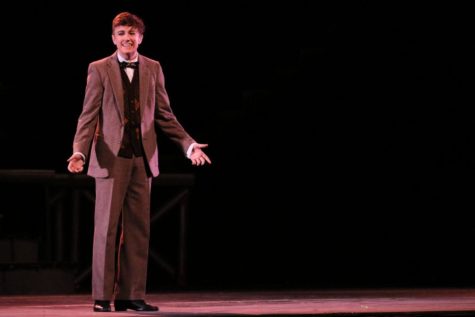“Theater District”- Declan Collins shines light on prejudice
September 27, 2019
OPRF prizes itself on its proggessive core values aiming to support all students regardless of race, gender identity, or sexual orientation. The demographics of district protocols and policies exemplify diversity.
It’s the student leadership that speaks loudest to these values. One example is senior Declan Collins, who is directing a show that has only been done by one other high school in 17 years.
The play, “Theater Distict,” directed by Richard Kramer, shares stories of characters who are gay, or questioning their sexual orientation, and transcend a hate crime. The powerful story is relevant not only to OPRF, but the country as a whole as it explores the difference between acceptance and tolerance.
In a school often portrayed as a paragon of diversity, Collins took a risk by gently pushing back and prompting the student body and community to examine the hidden prejudices ingrained by society.
Last May, Collins applied to be one of four student-directors for Studio 200, a completely student-run theater with the exception of two adult advisors.

Part of the lengthy application process was choosing a show. When it came time to make that decision, Collins knew he wanted to direct a show that was meaningful to him and share a story he was passionate about. “What I like most about theater is the storytelling of it all, it’s such a powerful art form in the way it shares people’s stories,” he explained. He decided on the award-winning play “Theater District,” originally performed in 2002 and since then has only been done a few other times professionally. The play brings to life stories of characters rarely showcased on an OPRF stage.
The story is set in the Upper East Side of New York City and centers around 15-year-old Wesley, who is questioning his homosexuality. After living with his mother and stepfather, he decides to move in with his distant father and his father’s long-term boyfriend, George. One day, Wesley and his best friend Theo, one of the few openly gay kids in their private school, are attacked in gym class for being gay. The hate crime against the two friends ends up bringing them closer together and raises the question of how accepting people truly are. As Collins put it, “It examines the limits of our own tolerance… and a lot of hidden prejudices come to life.”
The administration offered no arguments against a play espousing such issues. The show was reviewed by the two advisors of Studio 200, Ixtla Arceo-Witzl and Linda Burns. Their role, as Burns describes, is none other than “being the adult in the room.”
Arceo-Witzel and Burns are there to choose directors, oversee production, and offer solicited advice.
The rest is up to the director. The coveted student role is responsible for casting the show, running rehearsals, envisioning the set, and even designing the play’s T-shirt.
In Burns’ words, she chose Collins because he was commited “to choosing a play that he felt addressed issues that we have not been really addressing on our stages, mainly the experience of being gay in high school and just in this country.” The lack of these themes onstage made Collins know he wanted to have that conversation with the student body. Burns and Arceo-Witzl agreed with him. “Coming in with that kind of voice is really compelling,” said Burns “It’s courageous to say this is important.”
“Theater District” is a chillingly relevant show, following the events that prevailed at OPRF last year involving fascist graffiti. Hateful messages and symbols were airdropped during an assembly and written on bathroom walls.
In addressing the school’s own limits of tolerance, Collins said that “specifically for LGBT issues, OPRF is very accepting and open, but there is still prejudice.”
One specific prejudice the play sheds light on is the “perversion” of gay men and how they are often stereotyped as constantly seeking sex. “Even though people may be accepting of homosexuality,” Collins said, “there are still ingrained prejudicethey have that should be addressed and confronted.”
After school, Collins leads sun salutations and meditations as a warm up to create an enjoyable environment. He then runs through the more traditional processes of reading and blocking. For Collins, one of the most pertinent parts of rehearsal is reading through the script. “I really want to make sure that they understand what they are reading and why they are reading it,” he said.
One of Collins’ qualities Burns touched on was his thoughtfulness in approaching the script. “I was so struck with how well he analyzes text,” she said. “He thinks about characters in a way that is rooted in the text.”
Last year, Collins assistant directed Pygmalion alongside Burns, his first experience in directing. “I love Declan, his courage, and his thoughtfulness, he is just such a delightful person,” she said. “He creates a really warm atmosphere in his rehearsal space and listens to the voices that sometimes aren’t heard.”
Collins has displayed an immense amount of student leadership by choosing a show addressing relevant issues at OPRF that have gone unnoticed in the past. Collins said he hopes his bold choice will start the conversation with the student body and examine hidden prejudices.
